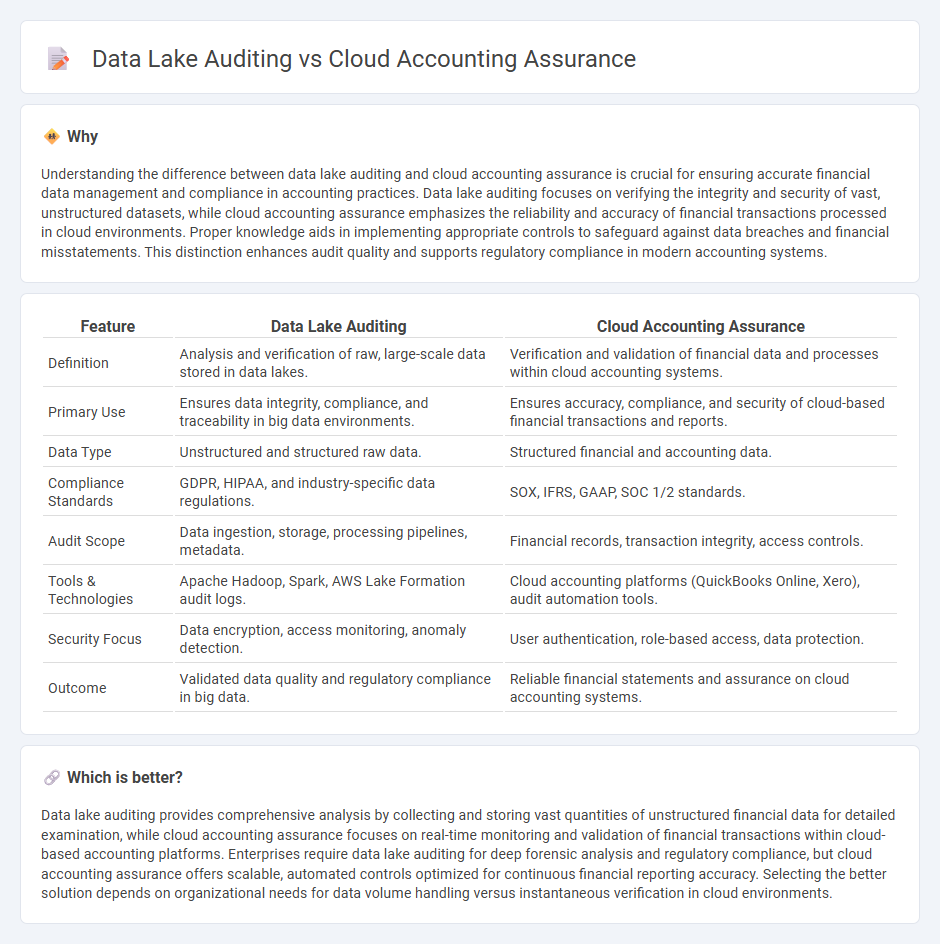
Data lake auditing provides a centralized repository for storing and analyzing vast amounts of accounting data, enabling enhanced transparency and real-time fraud detection. Cloud accounting assurance leverages scalable cloud platforms to ensure data integrity, compliance, and seamless financial reporting through automated controls and continuous monitoring. Explore the distinctions between these approaches to optimize your organization's financial audit strategies.
Why it is important
Understanding the difference between data lake auditing and cloud accounting assurance is crucial for ensuring accurate financial data management and compliance in accounting practices. Data lake auditing focuses on verifying the integrity and security of vast, unstructured datasets, while cloud accounting assurance emphasizes the reliability and accuracy of financial transactions processed in cloud environments. Proper knowledge aids in implementing appropriate controls to safeguard against data breaches and financial misstatements. This distinction enhances audit quality and supports regulatory compliance in modern accounting systems.
Comparison Table
| Feature | Data Lake Auditing | Cloud Accounting Assurance |
|---|---|---|
| Definition | Analysis and verification of raw, large-scale data stored in data lakes. | Verification and validation of financial data and processes within cloud accounting systems. |
| Primary Use | Ensures data integrity, compliance, and traceability in big data environments. | Ensures accuracy, compliance, and security of cloud-based financial transactions and reports. |
| Data Type | Unstructured and structured raw data. | Structured financial and accounting data. |
| Compliance Standards | GDPR, HIPAA, and industry-specific data regulations. | SOX, IFRS, GAAP, SOC 1/2 standards. |
| Audit Scope | Data ingestion, storage, processing pipelines, metadata. | Financial records, transaction integrity, access controls. |
| Tools & Technologies | Apache Hadoop, Spark, AWS Lake Formation audit logs. | Cloud accounting platforms (QuickBooks Online, Xero), audit automation tools. |
| Security Focus | Data encryption, access monitoring, anomaly detection. | User authentication, role-based access, data protection. |
| Outcome | Validated data quality and regulatory compliance in big data. | Reliable financial statements and assurance on cloud accounting systems. |
Which is better?
Data lake auditing provides comprehensive analysis by collecting and storing vast quantities of unstructured financial data for detailed examination, while cloud accounting assurance focuses on real-time monitoring and validation of financial transactions within cloud-based accounting platforms. Enterprises require data lake auditing for deep forensic analysis and regulatory compliance, but cloud accounting assurance offers scalable, automated controls optimized for continuous financial reporting accuracy. Selecting the better solution depends on organizational needs for data volume handling versus instantaneous verification in cloud environments.
Connection
Data lake auditing enhances cloud accounting assurance by providing a centralized repository for storing and analyzing vast amounts of financial data, ensuring transparency and compliance. Continuous monitoring and automated audits within data lakes enable real-time detection of discrepancies and anomalies in cloud-based accounting systems. Integration of data lake auditing with cloud accounting assurance strengthens internal controls, reduces fraud risks, and supports regulatory reporting requirements effectively.
Key Terms
Data Integrity
Cloud accounting assurance ensures data integrity through continuous monitoring, automated reconciliation, and secure access controls, reducing risks of financial discrepancies. Data lake auditing emphasizes scalable tracking of vast datasets with detailed metadata logging and immutable audit trails to maintain data accuracy and compliance. Discover how these advanced approaches safeguard your business's critical financial data integrity by exploring their features in depth.
Access Controls
Cloud accounting assurance emphasizes strict access controls through role-based permissions and multi-factor authentication to safeguard sensitive financial data and ensure compliance with regulations like SOX and GDPR. Data lake auditing focuses on monitoring and analyzing access logs with advanced tools such as Apache Ranger or AWS Lake Formation, enabling real-time detection of unauthorized access and data breaches in complex, large-scale environments. Explore the latest strategies for enhancing access control frameworks and auditing techniques to strengthen your organization's security posture.
Audit Trail
Cloud accounting assurance leverages real-time transaction monitoring and immutable audit trails to enhance financial accuracy and compliance. Data lake auditing emphasizes comprehensive logging of vast, unstructured datasets, enabling traceability and forensic analysis across diverse data sources. Explore in-depth comparisons to understand which approach best secures audit trail integrity for your organization.
Source and External Links
Is Cloud Accounting Secure - Cloud accounting assurance involves robust security measures like two-factor authentication, regular backups, third-party risk assessments, and compliance with regulations to protect sensitive financial data and ensure integrity.
Cloud Audit Suite: Solve multiple challenges with one ... - Cloud audit and assurance engagements are enhanced by cloud-based tools offering real-time updates, secure communication, and automated risk analysis for efficient and accurate financial audits.
Cloud Accounting Services - Cloud accounting assurance includes outsourced services that combine data accuracy, transaction automation, active analytics, and advisory support to help businesses streamline financial processes and make informed decisions.
 dowidth.com
dowidth.com